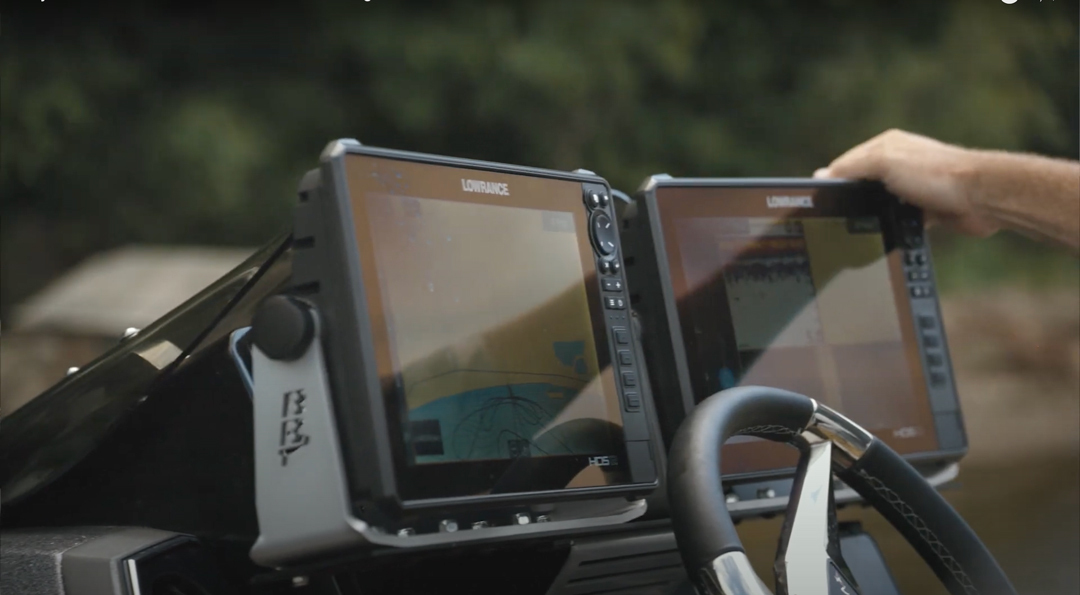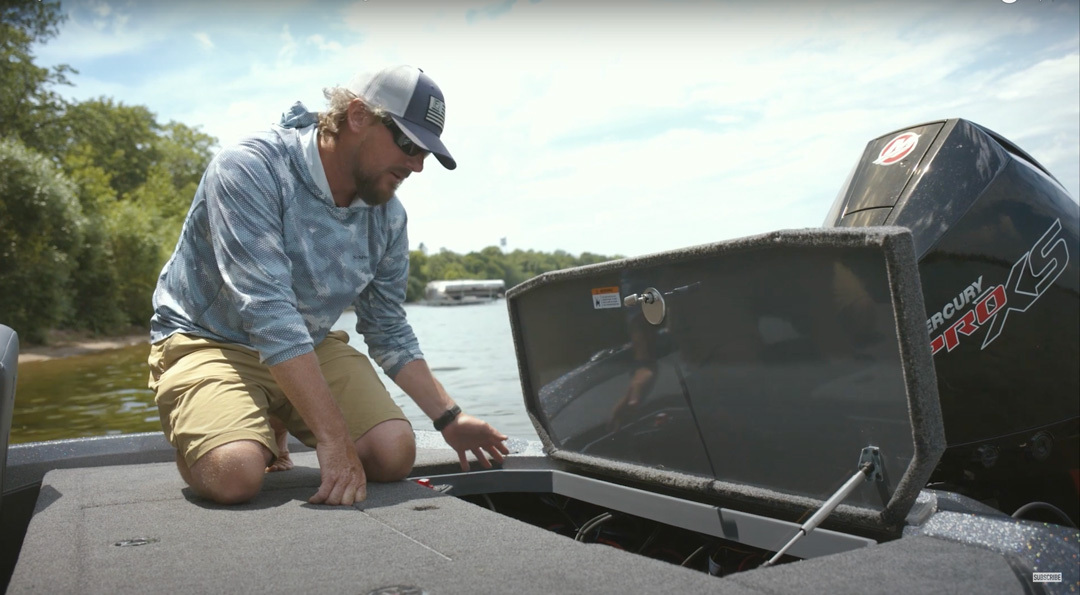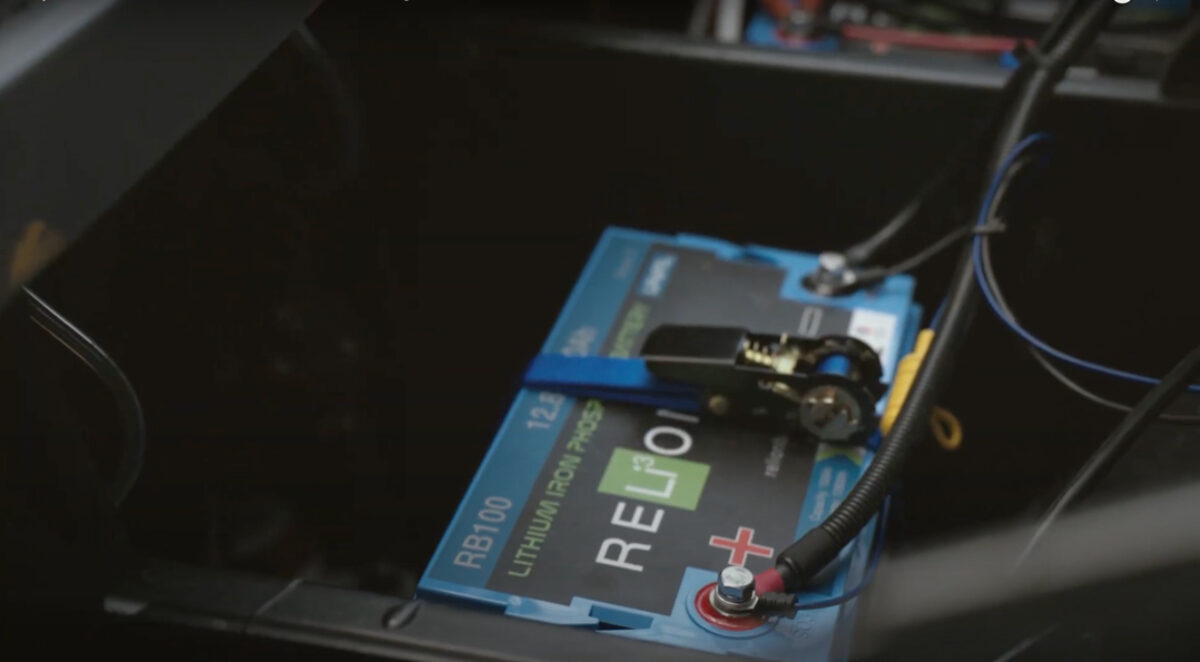As lithium battery pack prices have dropped 89 percent over the past decade, boaters are increasingly making the switch to lithium marine batteries, with affordable prices being just one of many reasons why. From enhanced efficiency to significantly reduced weight to longer-lasting power to safety, lithium batteries offer many benefits for any boater who wants to spend more time on the water with fewer worries.
The Benefits of Lithium Marine Batteries vs. Lead-Acid
Here are some of the top reasons why boaters are opting for lithium batteries over lead-acid for their adventures on the water:
- LiFePO4 batteries are smaller and lighter than lead-acid
- Lithium batteries last longer
- They have more power and operate at full capacity
- 2x faster charging rates
- They are an easy drop-in installation for your boat
- They have built-in safety measures
LiFePO4 Batteries Are Smaller and Lighter
Whether you use your boat for fishing, racing, or sailing, the last thing you want with you on your trip is extra weight, both in terms of maximizing speed as well as space. It’s important to keep in mind that lithium batteries weigh significantly less than traditional lead-acid batteries. In fact, they are on average about one-third to one-half the weight of lead-acid batteries of the same capacity.
For example, the VMAX 12V 200Ah AGM battery weighs 82 pounds more, or about 3x more, than the RELiON RB100 12V 100Ah battery, which only weighs 26.4 pounds. The reason we compared a 200Ah VMAX AGM battery to a 100Ah A RELiON lithium battery is that AGM batteries can only be discharged down to about 50 percent, unlike lithium batteries, as a 200Ah rated AGM battery is actually equivalent to a lithium battery with half the rated capacity (100Ah). They are significantly more compact and lighter while also offering greater energy density or more energy in relation to the battery’s size.
At 1/3 the weight of traditional lead-acid batteries, lithium won’t slow you down. This is paired with lithium’s higher usable capacity – generally 80% or higher, vs. lead-acid’s average of 30-50%. So, what does it mean for your marine applications? You’re getting a lightweight marine battery that holds more power, giving you the ability to go farther, and faster. Decrease the weight of your boat and increase your capability for speed.
Boost Your Boat's Fuel Efficiency
Heavy lead acid marine batteries drag your boating speed and performance down. When you have a small boat, a heavy battery also reduces your fuel consumption efficiency. Instead, you need a lightweight lithium marine battery that’s optimized for high performance. When you increase your boat’s fuel efficiency, you save time because you don’t have to take as many trips to the fuel dock. You also save on fuel costs, especially if you’re out on the water frequently. Additionally, the less fuel you use helps reduce your carbon footprint by decreasing emissions.
If you’re like most boat owners, you’re going to carry gear and supplies on board when you’re going out. Lures, tools, and cases of beverages all add up in terms of extra pounds. One of the easiest ways to improve fuel efficiency is to reduce a boat’s weight. With a lightweight lithium battery, you don’t have to sacrifice as much of your gear to achieve greater fuel economy.
Increase Your Boat's Speed
Heavy lead-acid batteries only slow your boat down. Extra weight causes your boat to displace more water as it moves, which means it must use more energy to push through the water. As a result, you can’t travel as fast. Being lower in the water also increases drag and inhibits acceleration. A high level of buoyancy is preferable for shallow water boats and other small craft. Without a heavy battery, you are able to change directions more quickly and maximize your top speed.
While heavier boats have more momentum, this benefit is usually only helpful under poor weather conditions. Plus, after your boat stops, it takes more energy to get back up to speed. All-in-all, it’s better to keep your boat as light as possible.
Reduce Your Boat's Draft
You’re able to reduce the distance between your boat’s lowest point and the surface of the water when you’re running lithium technology. Boats with small drafts are able to navigate shallow waters, allowing you to access out-of-the-way ports or even take your boat right up to the beach.
While it’s useful to consult charts and observe watermarks on surrounding structures, you may not always know how deep the water is if you’re navigating an area where the tide rolls in and out. It’s important to have a small draft when you travel in shallow waters to avoid hitting underwater objects or getting stuck on sandbars.
Lithium Marine Batteries Last Longer
Not only are marine lithium batteries smaller and lighter, but they also last longer than all other battery options, which translates to much lower replacement costs and fewer headaches. The average lead-acid battery is supposed to last about 1,000-1,500 cycles in its lifespan, but less than half of lead-acid batteries actually reach near this lifespan.
A lithium battery, on the other hand, has an average life of 3,000-5,000 cycles, depending on the depth of discharge. Batteries like RELiON's Lithium Iron Phosphate (LiFePO4) batteries are designed to provide 3,500 cycles at 80 percent depth of discharge and even greater cycles at lower depths of discharge. Notably, this higher life cycle does not even require the high levels of maintenance that most lead-acid batteries require for their shorter life spans. With a lithium battery, you can get a battery life that is sometimes as high as 10x longer than a lead-acid battery.
This long battery life means you get more out of your battery and save money over the long run since you will not need a replacement as soon as with a lead-acid battery. Additionally, if you do have any concerns with your lithium battery, you can count on RELiON’s 10-year guaranteed warranty. The longer lifespan is particularly important for professional fishermen or sailors who are out at sea for long periods of time.
No one wants to be stranded on the water. So, having a reliable battery should be your first priority when shopping for your marine applications. If you choose lithium, your battery’s life span could even exceed the life span of your boat, while standard battery life spans last only one to two years. Instead of worrying about lead-acid batteries leaving you dead in the water, trust lithium for a reliable marine energy source.
Lithium Batteries Have More Power And Operate at Full Capacity
Beyond the advantages of weight reduction, lithium batteries have several other attributes that make them ideal for your marine application. When buying a battery for your boat, you would expect that, at a minimum, it would be able to be fully discharged up to the rated or marketed capacity (i.e., 1,200 Wh, 2,400 Wh). Unfortunately, lead-acid batteries can become damaged when more than 50 percent of their capacity is used. This is not the case for lithium batteries, which can be discharged as high as 80 to 100 percent without incurring any damage. Lithium batteries’ much greater discharge capacity means you receive more energy throughout every charge/discharge cycle every day, allowing you to truly maximize your time on the water.
LifePO4 batteries have low self-discharge rates. This helps extend storage time and eliminates the need for frequent battery charges. Batteries like the RELiON RB100-HP battery also have a maximum continuous discharge current of 100A and a peak discharge current of 800A, which is far more robust than similar capacity lead-acid batteries, which have an operational capability that is only a fraction of this.
Installing LiFePO4 on your boat gives you ample power to run all of your GPS systems, graphs, live fishing wells, radios, and anything else you may need for a full day out on the water.

Fast Charging Lithium Marine Batteries
Lithium batteries are not only capable of operating at full capacity and lasting longer but also charge faster as well. A lithium battery can charge in little as 4 hours as opposed to lead-acid batteries, which can take upwards of 10 hours to fully charge. Lithium-ion marine batteries also have a low resistance, which promotes these faster charging times and helps sustain voltage under heavy discharge loads. Additionally, a lithium battery can be recharged multiple times a day, but it is usually recommended that a lead-acid battery only be charged once in a 24-hour period so as to not further reduce the battery’s lifespan. With a lithium battery, you get to enjoy a faster charge time and a charge that lasts much longer than a lead-acid battery, allowing you to make the most of your time on the water.
Easy Drop-In Battery Installation For Your Boat
At first, it may seem that installing a lithium battery is a complicated and lengthy process, but fortunately, this is not the case. For example, RELiON’s batteries are known for being simple and streamlined to install due to the way they were designed. Their batteries come in standard Battery Council International (BCI) sizes for easy, drop-in replacement, which comes in handy when you’re trying to efficiently upgrade a lead acid battery bank.

Particularly with the guidance of RELiON’s experienced and responsive support team, you have the benefit of getting all of your questions answered by knowledgeable experts, making the switch to a lithium battery as smooth as possible. One of the company’s recent boating customers shared:
“I was so worried about changing to a lithium battery because it felt intimidating and I was overwhelmed. This all changed the minute I got support from the RELiON customer service team who helped walk me through every step of the process.”
Safety
For the safest choice in a power source, LiFePO4 batteries are the clear option. While any battery could malfunction, RELiON lithium iron phosphate batteries include a fail-safe measure, causing the battery to automatically disconnect if the unit nears overheating. Meanwhile, unsafe placement of metal items stored near lead acid battery compartments could lead to a dead short across battery terminals, potentially causing an explosion or fire. With RELiON batteries, you mitigate the risk of fire and keep your marine application sailing smoothly.
Is A Lithium Battery Right For Your Boat?
When you want to improve overall performance, switching to a lithium marine battery is a less time- and cost-intensive alternative to power your watercraft. It’s like getting a new and improved boat simply by changing your power source!
RELiON has a large number of batteries that are ideal for marine use. You can get more power and a faster charge all while saving space on your boat. To learn more about how to calculate your energy needs and find the optimal battery for your application and usage, visit our Lithium Battery Selector Tool. If you have additional questions about how a lithium battery can help fuel your next boating adventure, or if you have questions about a specific battery, contact a RELiON professional today.
